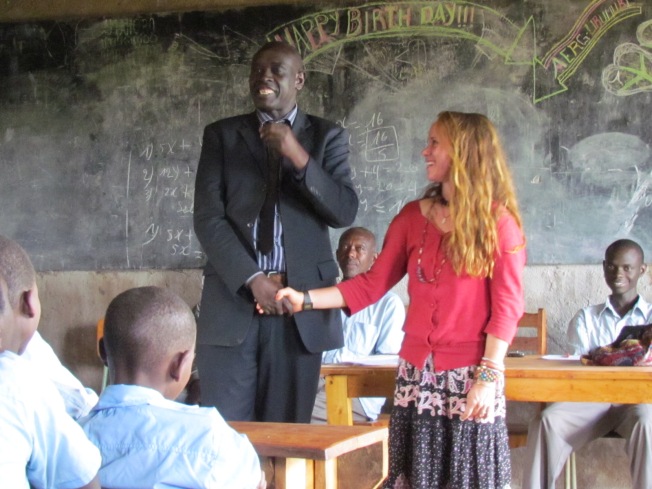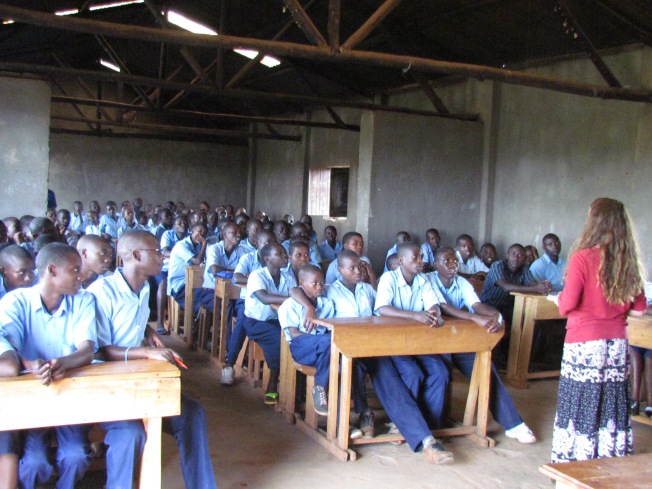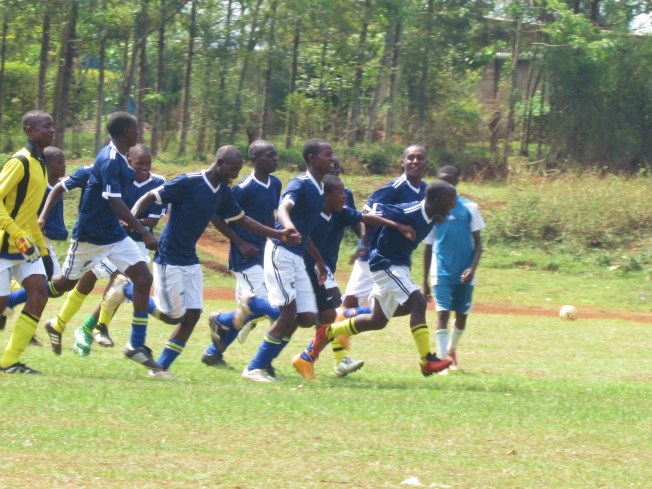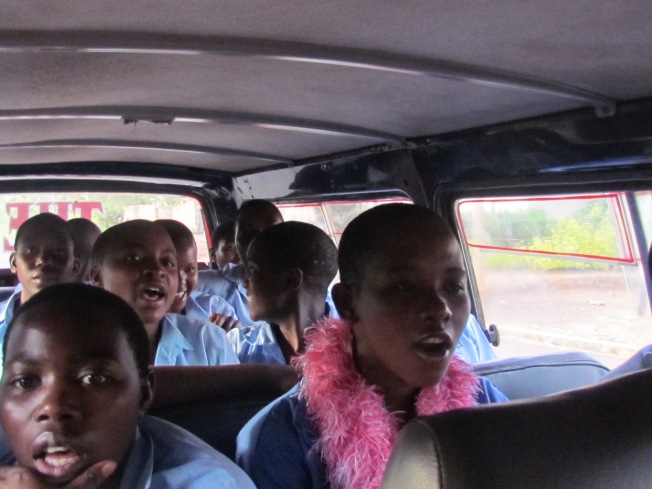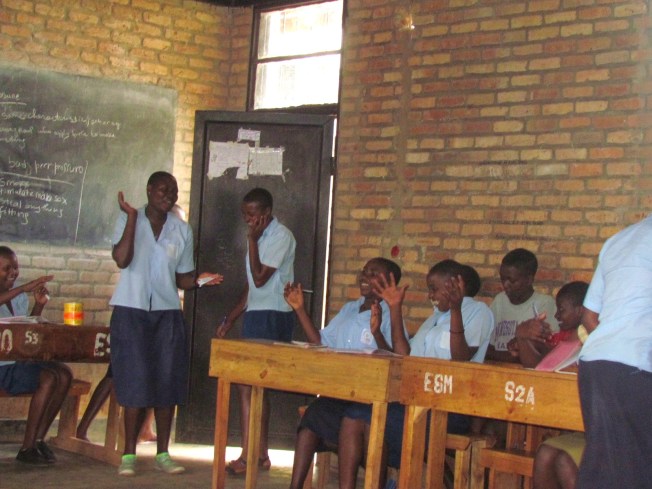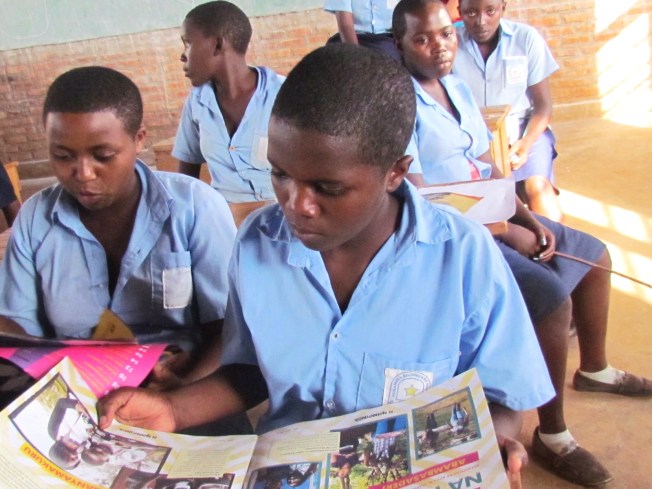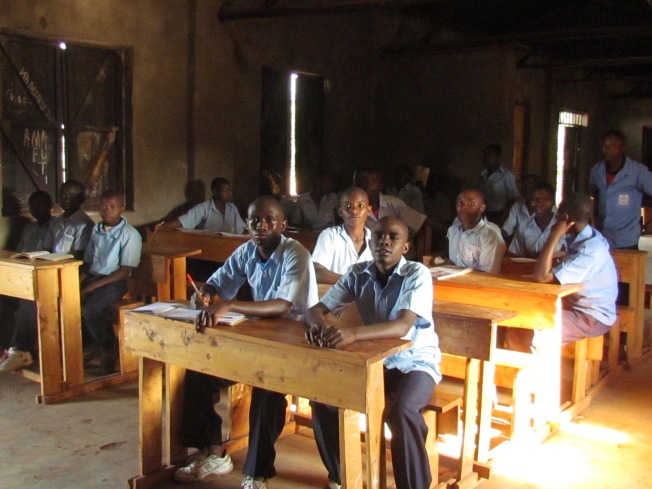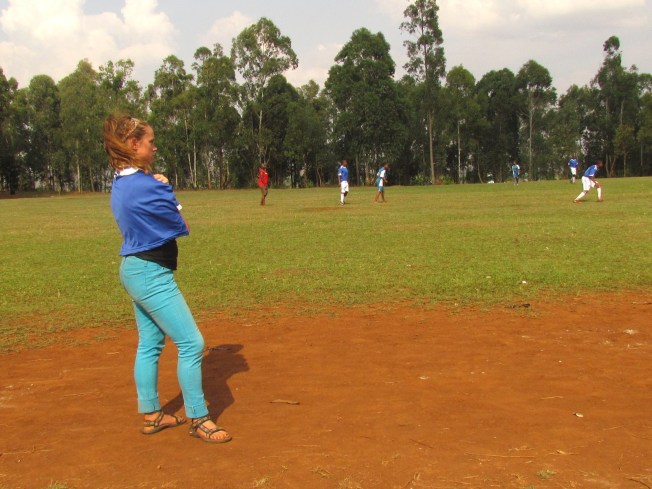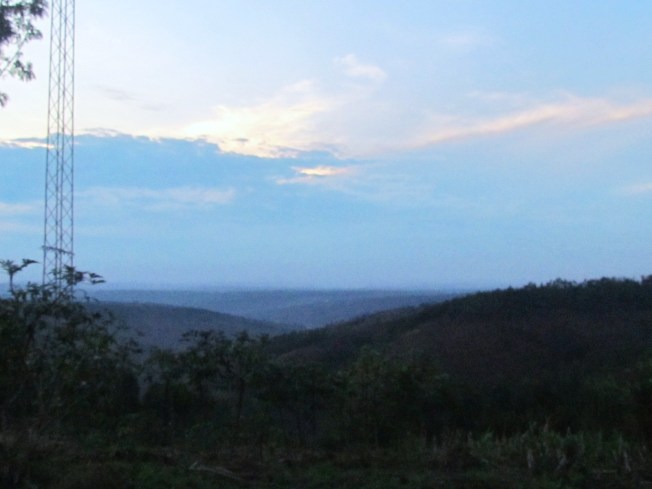*
Fidele reads from a short-handed list of the things he has interpreted as my successes while in Ruramira as a teacher, Peace Corps volunteer, and community member. I nervously smile, nod my head when appropriate, and listen as he describes to our student body, teachers, and administration what my two years have added up to.
He touches on the tangible things: he talks about the improvement of students’ ability to speak the English language (or at least try), he gives great gratitude for the sports project, and he commends the objectives and achievements of Ruramira Secondary School’s GLOW Club. He continues to describe what he feels are my most laudable personality traits: I am a umunyaukuri (a person of truth), a hard-worker, punctual (Lord knows any American could be in this culture), and he says that he can see that everything I do comes from the fact that I love people. He chuckles and proceeds to tell the student body that I actually know more about the inter-workings of families in our community than most due in large part to the many home-visits I have completed.
I’m humbled and proud of his assessment; if this is what he can take-away after two years, then I certainly have demonstrated the values and characters in which I try to live my life. Moreover, Fidele, perhaps more than any other co-worker of mine, has seen me at my worst. He has seen me when I have been angry and unforgiving to Rwanda. He has seen me act cold and distant when I’ve been unable to culturally adjust. He’s seen me cry a handful of times when I lose words – either in English or Kinyarwanda – to describe the frustrations I feel. And yet, he can still say such nice and warm things.
I smile and also sigh heavily; I really don’t know how to do this.
We are at my goodbye “party” which is taking place on the last day of term III and thus the last day of the 2013 school year. The students have moved a great number of desks to one of the school’s large, open rooms, and they are smushed together – so they can listen to the speeches that are an ever-present part of any Rwandan gathering. The program is relatively simple: Fidele speaks, some of the girls sing and dance for me (traditional music, of course), Headmaster commands each class takes a photograph with me, Headmaster speaks, and finally, I take 5 minutes to speak the last words I will speak in front of these students.
I had written my speech the night before. It was simultaneously easy and difficult. The ideas came easily but the words did not. How do you begin to thank a group of people for giving me what I have been given? For two years, I was shown a particular way of life; I was provided a purpose; and I was opened up to numerous special relationships. And so I was glad I had prepared the words below the night before. It gave me the time I needed to sort everything out the way I wanted to say it in the most concise way possible. I also made the conscious decision to speak in King-lish (an uninterrupted combination of both English and Kinyarwanda; my most common way of communicating while in the village and with my students). These were my words when it came time to speak and say goodbye:
Hello my dear headmaster, DOS, Jessica, and all the wonderful teachers.
Hello my super students – ugire amahoro (peace be with you)!
Today I am happy because we are together. Ariko (but), I am also sad because today will be our final day as a group – it is our last warning.
In a short time I will go back to America. In America I will see my beautiful family, my dog, and my home but I will miss Ruramira greatly.
Nzakumbura imisozi, nzakumbura abakekuru, nzakumbura ibitoki kandi ubugari cyane pe, nzakumbura umuco mu Rwanda, ariko nzakumbura i Ruramira cyane cyane cyane. (I will miss the mountains, I will miss the old mamas, I will miss bananas and cassava bread a lot, I will miss the culture of Rwanda, but I will miss Ruramira the most).
Namukunze cyane. Namukunze kandi nzakomeza kugira urukundo kubera mwese mufite umuco mwiza. Mufite umutima mwiza. (I have loved you greatly. I have loved you all and will continue to have love because all of you have a good culture. You all have good hearts).
You have the motivation to increase the life for you, your family, and your country.
To be a teacher in Ruramira was difficult in the beginning ariko now kumererwa neza (it is very comfortable). Noneha (at this time), Ruramira ni wacu (Ruramira is the home for all of us).
My favorite time in Ruramira was at this school. The best days were teaching songs from America, watching you students show theatre, helping GLOW club, and coaching football. I will never forget those times and all of you.
Sinshobora kwibagirwa (I could never forget).
Mfite imyizerere ko Imana ateguye kuzana mwese mu ubuzima banjye. Kubera wowe na kubera Imana nagize amahirwe. Nabonnye amahoro, nabonnye umuhati, nabonnye ubucuti. Murakoze cyane. (I have the belief that God planned to bring all of you in my life. Because of you and because of God I have had an incredible opportunity and chance. I have seen peace, I have seen courage, and I have seen friendship. Thank you very much.)
I hope in my 2 years I was able to help you do something. Birashoboka (perhaps), the English for you has increased. Birashoboka, you had the improved opportunity to play sport. But most importantly, I hope I helped you to find icyizere (confidence) and the belief that yego washoboye (yes you can)!
My goal as a teacher was also to be a friend, an umujyanama (counselor), and a supporter for you.
All of you students have the ability and power to have a good future – but it starts with you.
Thank you for sharing your hearts, your ideas, your love, and your home. Thank you for helping me to be an umunyarwandaikazi (Rwandan women). Ushaka inka aryama ntayo (Rwandan proverb: if you want a cow, you must lie like it). Thank you for making Rwanda a special part of my life forever. I will always remember this excellent place. One day I hope to come back and visit and see you students as leaders for this country – because yes you can.
I am sad to go.
Ndababaye cyane kubera umutima wanjye iri i Rwanda na Amerika. Ntakobwa ariko kubera Imana. (I am really sad because my heart is in two places; Rwanda and America. I don’t have fear though, because we have God).
Turi (we are) together in the spirit.
Imana ikomeze kubaha umugisha. (May God continue to bless all of you).
*
After I finish, my goodbye is over. It’s that simple. The school has a plan to continue to distribute the students’ reports and because we are over 2 hours late, we must move quickly. The top students in each class are announced and the class teachers call the names of their students so that they can see the results of how they performed for the entire year. Disorder creeps into the school day and so it makes a long-drawn out goodbye impossible. Students are everywhere. Some still need to pay school fees. Some want the village photographer to take a photo with myself and them. Some just want to return back home. I loiter for a while, but eventually, I resign myself to the small bar not too far away from school. Our headmaster has arranged for school sponsored fanta, beer, and goat meat (brochettes).
It feels weird that that was the goodbye. The speeches were wonderful and it was really kind for my school to organize something just for the sake of giving appreciation. Yet, it just ended. Like that. It felt weird that it could be over, after so many months, days, and hours spent at my school. I was perfectly okay with a goodbye that wasn’t full of tears and drama, but it just felt strange. That’s all. I drank a turbo king (one of the few beer brands available in-country) along with my teachers that afternoon and fully recognized my inability to process the movement of time. It wasn’t until a few days later when I actually thought about it:
um hello. That was the last time you will see most of those students. Ever.
As usual, I was on a run when this thought finally made some connection in my head and heart and I had to stop running for a few moments.
My students were the ones who taught me. My students were the ones who became my friends. We had our ups and downs, my students and I, but I could never relegate their influence in my life.
Many of them live in conditions that some of the world could never understand. I will never ever be able to reconcile why does the world work this way? when it comes to piecing together the circumstances that life has dealt them.
My students were the best thing about living in Rwanda.
And maybe what I dislike the most about goodbyes is that there are never enough words. And the words you use don’t necessarily convey exactly what you want to say. You try to explain further in detail, but it’s almost as if the more words you use, the less expressive you feel. So that speech above? Yeah, I think it covered most of what I wanted to say. It hit the right mixture of the two languages I have been speaking for two years. But, I wasn’t sure if my students walked away knowing just how grateful I am for their presence in my life.
*
The school goodbye marks a final transition and shift regarding my Peace Corps service. Now, my primary assignment is officially completed. I’m done.
As November nears, I am more and more aware of the time remaining. I have 6 weeks left in Rwanda.
This phased goodbye process is great in that you feel relatively stable as it goes. Yes, goodbyes are difficult, but slow by slow you can build the closure you need to really bring things to an end.
That’s essentially what I am doing the last 6 weeks I am here; slowly saying goodbye.
I have to admit, I am a little afraid of what it will feel like in the final hour, when it really is all over. I’m afraid because the down-side of spacing out goodbyes as such is that when you’re finished, that’s it. You are forced to look at life change in the face and accept it without question, hesitation, or delay.
Divine recently moved in with me for the next month in order to be better located for the national exam she will take, to help me pack, and to accompany me on what I have dubbed my Goodbye Tour. Nearly all of the Peace Corps Volunteers in my group will leave in early November and so Divine was adamant that my last days are not spent alone in my house. I am so grateful for this decision as it’s been like having a sleepover each and every night; we talk late into the night and wake early in the morning to drink tea and coffee. I then read from the Jesus Calling devotional (thanks Grandpa and Glenda!). At the end of the small devotional blurb, she reads the provided scripture in Kinyarwanda, I follow by reading from my English bible. Most of all, after living relatively alone for two years, it’s an amazing thing to have someone else around – to share meals, to chat, and just to have the company. The routine of her presence has provided a level of comfort that I never knew I could have in a country so far from my own.
It’s this, I think, that scares me the most about saying the REAL goodbye in over a month. I can say goodbye to my life as a Peace Corps Volunteer, I can muster a teary farewell to my village, and as I have already done, I can make peace with having finished my job as a teacher. But, say goodbye to that kind of friend? Say goodbye to the intangibles that a friendship like that brings?
I don’t know.
We both are aware it is coming and we touch on it from time to time, but never too long. Perhaps it’s a state of denial, again, I don’t know, but I figure it’s okay because it’s making my last days enjoyable, memorable, and a fun part of this journey in Rwanda.
This is all mutually exclusive from the joy and excitement in returning home, obviously. That feeling and anticipation is 100% present throughout the process of goodbyes as I remember that I’m lucky to have something so wonderful to go home to (namely, family and friends).
And so, it’s a matter of clinging strongly to our beliefs, our relationships, and the experiences we know to be true that make goodbyes bearable. I personally believe that God’s hand and love are most visible in times of transition and change; if He got us there in the first place, then surely He will put us right where we need to be. And, if he has continually put amazing people in our lives then that is forever. You may not get the people you want in the physical sense, but they change your lives for the better and you keep that always, no matter where you go. It’s not easy, it’s not always ideal, but it’s the reality.
When you become best friends with a person you don’t always know what they will bring. In foresight, I could never have known what Rwanda, Peace Corps, my school, or Divine was going to do for my life. Now, I’m starting to get an idea and I’m humbled, grateful, and happy with what I see and feel. I’m continually blown away. Hindsight is a beautiful thing. You see God’s hands in all that He has touched and orchestrated and you are unable to fathom at just how awesome it all is.
Here’s to one last, final month.
May it be full of laughter, memories, and a solid foundation to say a necessary goodbye. It’s these goodbyes that will lead me into the next chapter, a chapter that is waiting back home with more incredible people that God has so infinitely blessed me with.
Here we go.
*
